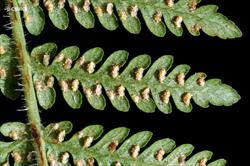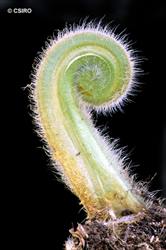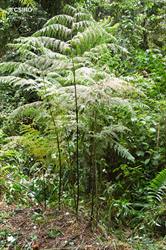Dennstaedtiaceae
Australian Tropical Ferns and Lycophytes - Online edition
Hypolepis tenuifolia




Hypolepis tenuifolia (G.Forst.) Bernh. ex C.Presl
Link to Australian Plant Name Index for publication details and synonyms: https://id.biodiversity.org.au/name/apni/67332
Rhizome long creeping, hairy. Stipe and rachis dark chestnut-brown below, yellow-brown or green at apex, bearing abundant glandular and non-glandular hairs; stipe 40–170 cm long, 3.5–10 mm diam. Lamina broadly ovate to broadly elliptic, 25–200 cm long, 28–140 cm wide, 4–5-pinnate at base, with dense fine colourless glandular and non-glandular hairs 0.1–0.8 mm long on undersurface. Primary pinnae in 10–30 pairs; longest 16–100 cm long, 11–50 cm wide. Longest secondary pinnae 7–35 cm long, 3.5–15 cm wide, decreasing markedly in size along primary pinnae. Longest tertiary pinnae 2–17 cm long, 1–6 cm wide, with winged midribs. Quaternary pinnae 5–35 mm long, 2–12 mm wide, often divided to midribs. Veins ending in apices of ultimate pinnules. Sori lacking paraphyses, protected by broad reflexed membranous flaps 0.5–1.2 mm wide. Spores pale, echinate, 33–36 × 20–23 µm.
Occurs in NE QLD between Cooktown and Eungella, usually in mountainous areas. Also widespread in Asia, Malesia and the Pacific Islands.
Terrestrial in rainforest, usually in well-lit areas or disturbed sites.
Field AR, Quinn CJ, Zich FA (2022) Australian Tropical Ferns and Lycophytes. apps.lucidcentral.org/fern/text/intro/index.htm (accessed online INSERT DATE).
Field AR, Quinn CJ, Zich FA (2022) ‘Platycerium superbum’, in Australian Tropical Ferns and Lycophytes. apps.lucidcentral.org/fern/text/entities/platycerium_superbum.htm (accessed online INSERT DATE).







